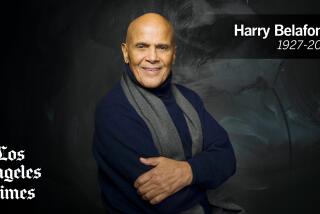‘The best thing I do is take raw talent and make it look great.’
- Share via
Horace Heidt, singer, bandleader and roving talent scout in the 1920s, ‘30s, ‘40s and ‘50s, is alive and well and living in Sherman Oaks. He owns a 10-acre apartment complex that boasts an 18-hole par 3 golf course, four waterfalls and three myna birds.
On one Saturday in 1918, when I was attending Culver Military Academy in Indiana, I was in a track meet at 11 in the morning, pitched a baseball game a 1 o’clock and struck out 16 batters, went to a swimming meet after dinner and won my event and then won a boxing match at 9 o’clock.
I wanted to be an athlete. I thought maybe I’d be a boxer. But when I tried out for the Olympic Games some big guy knocked my block off and I said boxing is not any business for me.
I started working in a gasoline station in San Francisco. That helped put me through the University of California in Berkeley. I played running guard on the university football team and got a fractured back during a game. The doctor said, “No more football. You’ll be lucky if you can walk, and you can’t do any more work at the gasoline station. That’s out.”
When I was in the hospital it was fortunate that a record came on the radio. It was Guy Lombardo. I said, “My goodness, I love music. If he can make it with a little band like that, certainly I can with a little idea.” So I dreamed big.
I organized a three-piece band and we played the Claremont Hotel in Berkeley. That’s the way it started.
The amazing thing is that 20 years from the date that I heard Guy Lombardo in my hospital room. I was in New York performing at the Biltmore Hotel, Guy Lombardo was at the Roosevelt and Tommy Dorsey was at the Commodore. Everybody wrote about the “Battle of the Bands.” We were all winners. Everybody did well.
The Original Youth Opportunity Program that toured the country for five years following the war was the best show I ever did. We toured every city in America and auditioned talent. That’s the way we discovered Art Carney, Gordon MacRae, Frankie Carle and Alvino Rey.
The best thing I do is take raw talent and make it look great. Let’s take Dick Contino. I saw him in a butcher shop working for his father in Fresno. He had a lock of hair over his forehead and he was looking good. Immediately I thought of Rudolph Valentino, so I dressed him up in a yellow shirt and tight pants and put him out there on the stage and he was a sensation overnight. He was tremendous. We used to have them lined up around the block to see him. Calling him “Rudolph Valentino of the Accordion” put the thought in their minds, and even on radio this fellow was Valentino.
There’s a great need for a program, not in Hollywood but to tour America, to go around to all these little cities and give these young people a chance. They’re all out there waiting.
Developing this resort living complex was my second career. At the time I worked at the gasoline station in college, I also worked in real estate in Oakland, so I knew real estate was great. That era when I was learning and when I was marketing for the sponsor on tour made me ready for today. I didn’t die off when I was 55 years old. I remembered what Bob Peck, my football coach at Culver, said. “Don’t lie down bravely and die; fight like hell to live.”
I would like to have stayed on in music. I tried all the time to get back into music. Even when I was building this place I made pilots so I could get back into television. It never sold.
I’ve had six failures in my life. Failures usually come at the end of an era. Emerson says the stuff you’re made of only comes out when you’re up against failure. So it’s up to you. You’ve got to do something. Every time you work hard and do something beneficial even for yourself you’ll make more money and do better in life. Every time you do something good for a person it comes back. That’s the No. 1 principle; you want to help people all you can.
More to Read
Go beyond the scoreboard
Get the latest on L.A.'s teams in the daily Sports Report newsletter.
You may occasionally receive promotional content from the Los Angeles Times.









